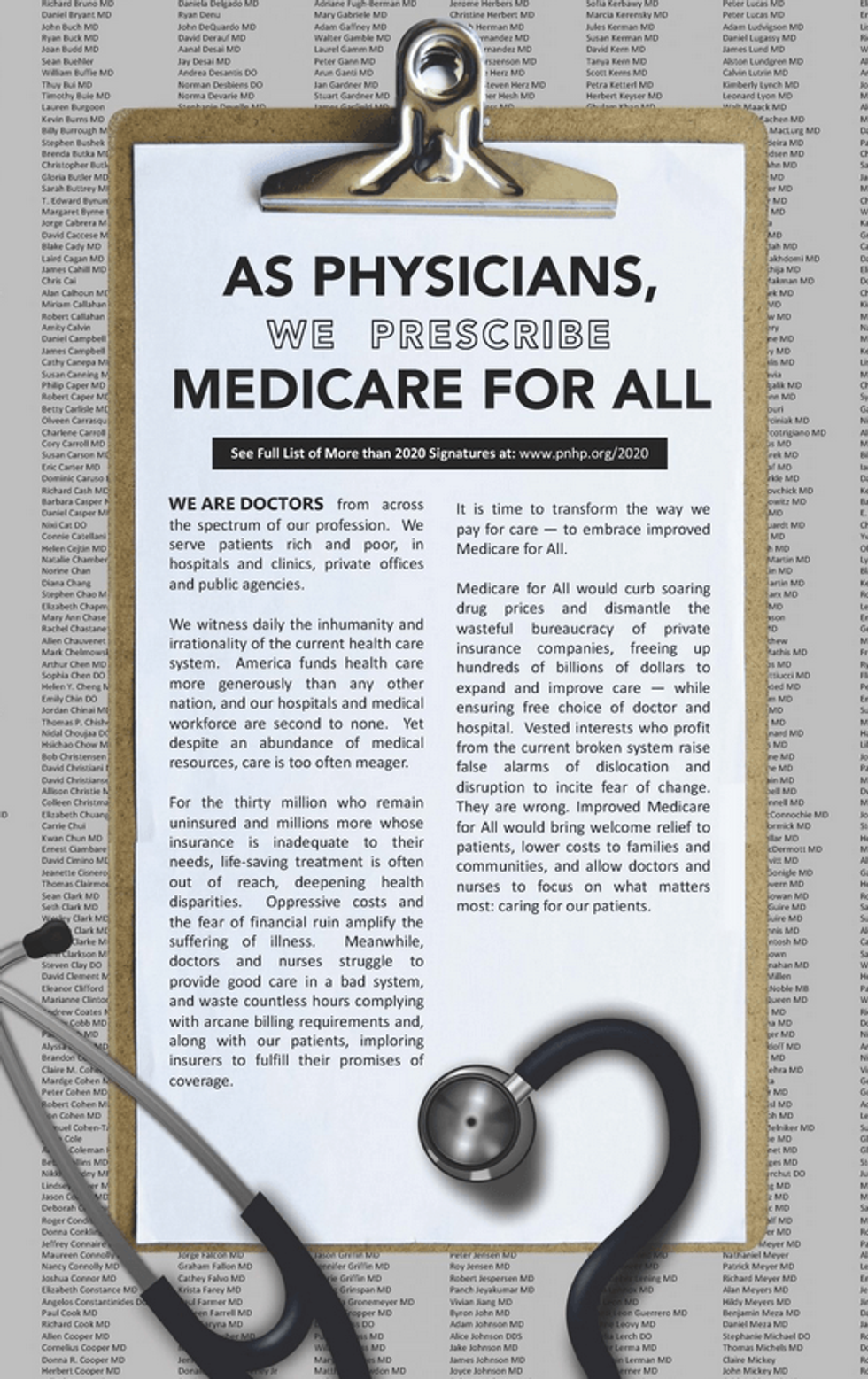The fight for Medicare for All received a two-handed boost from tens of thousands of doctors on Monday when the American College of Physicians--in a move described as a "seachange for the medical professions"--officially endorsed a single-payer system as among only one of two possible ways to improve the nation's healthcare woes.
Representing 159,000 doctors of internal medicine nationwide, the ACP is the largest medical specialty society and second-largest physician group in the country overall after the American Medical Association (AMA).
"All over this country, a growing number of doctors are sick and tired of the enormous waste and bureaucracy that exists in our cruel and dysfunctional healthcare system."
--Sen. Bernie Sanders (I-Vt.)The ACP delivered its case in a 43-page position paper--titled "Envisioning a Better U.S. Health Care System for All: Coverage and Cost of Care"--published in the Annals of Internal Medicine on Monday. According to the paper:
Although the United States leads the world in health care spending, it fares far worse than its peers on coverage and most dimensions of value. Cost and coverage are intertwined. Many Americans cannot affford health insurance, and even those with insurance face substantial cost-related barriers to care. Employer-sponsored insurance is less prevalent and more expensive than in the past, and in response, deductibles have grown and benefits have been cut. The long-term solvency of U.S. public insurance programs is a perennial concern. The United States spends far more on healthcare administration than peer countries. Administrative barriers divert time from patient care and frustrate patients, clinicians, and policymakers. Major changes are needed to a system that costs too much, leaves too many behind, and delivers too little.
Sen. Bernie Sanders (I-Vt.), a leading candidate for the 2020 Democratic presidential nomination and the author of the The Medicare for All Act of 2019 now in the U.S. Senate, welcomed the development.
"I am delighted that the American College of Physicians has come out in support of a Medicare for All, single-payer healthcare system," Sanders said in a statement emailed to Common Dreams.
"All over this country, a growing number of doctors are sick and tired of the enormous waste and bureaucracy that exists in our cruel and dysfunctional healthcare system," Sanders added. "They are sick and tired of spending time filling out reams of paperwork and arguing with insurance companies. Medicare for All will give doctors the freedom to focus on making their patients healthy, not making health insurance executives wealthy."
"Major changes are needed to a system that costs too much, leaves too many behind, and delivers too little."
--The American College of Physicians (ACP)The ACP's detailed review of the current for-profit system--even with some of the improvements resulting from the Affordable Care Act (ACA)--found that "too many Americans are uninsured or underinsured" and that current spending is "high and unsustainable"--especially as other developed nations show their ability to achieve better or similar outcomes for less while offering universal, government-guaranteed coverage to all.
While it did not say that Medicare for All was the only way to achieve a more equitable, accessible, and sustainable healthcare system, the ACP laid out four key recommendations for achieving universal coverage in the United States. They are:
1. The American College of Physicians recommends that the United States transition to a system that achieves universal coverage with essential benefits and lower administrative costs.
2. Coverage should not be dependent on a person's place of residence, employment, health status, or income.
3. Coverage should ensure sufficient access to clinicians, hospitals, and other sources of care.
4. Two options could achieve these objectives: a single-payer financing approach, or a publicly financed coverage option to be offered along with regulated private insurance.
While acknowledging that a transition to Medicare for All could be "highly disruptive" to the healthcare system, the ACP said "single-payer financing approach could achieve [its] vision of a system where everyone will have coverage for and access to the care they need, at a cost they and the country can afford. It also could achieve our vision of a system where spending will have been redirected from health care administration to funding coverage, research, public health, and interventions to address social determinants of health."
Medicare for All, the paper continued, could also "achieve other key policy objectives, including portability, lower administrative costs and complexity, lower premiums and cost sharing, lower overall health care system costs, better access to care, and better health outcomes, depending on how it is designed and implemented."
"As physicians, we see daily the harm that our fragmented, private-insurance based system does to our patients."
--Dr. Adam Gaffney, PNHP
While the ACP in its backing of a single-payer approach also co-endorsed the more incremental step of creating a federally-administered "public option" as a pathway to universal coverage, Drs. Steffie Woolhandler and David Himmelstein, co-founders of Physician for a National Health Program (PNHP), argue the latter would be an inferior avenue if the aim is to cover everyone while reducing overall costs.
According to an op-ed by Woolhandler and Himmelstein, also published in the Annals alongside the ACP's new position paper, "Achieving universal coverage would be costlier under the "public choice" model the ACP co-endorses along with single payer."
Unlike a public-private mix of coverage that the public option would represent, the pair write, a single-payer Medicare for All would allow hospitals and doctors to "save billions on billing-related costs" each year, and those savings could be re-purposed "to expand care" to millions for less cost than the status quo.
In a separate but related move to the ACP's announcement, more than two thousand physicians on Monday
announced an open letter to the American public, prescribing single-payer Medicare for All, in a full-page ad in
The New York Times that will run in the print edition on Tuesday, January 21, 2020.
Among the doctors "prescribing" Medicare for All as the only serious solution to the nation's healthcare crisis, said PNHP--which helped organize the effort--"are towering figures in American medicine" and include Dr. Marcia Angell, former editor-in-chief of the New England Journal of Medicine; Dr. Bernard Lown, developer of the defibrillator; Dr. Paul Farmer, infectious disease expert and founder of Partners in Health; and Dr. Mary Bassett, former New York City Health Commissioner.
The full text of the open letter follows:
We are doctors from across the spectrum of our profession. We serve patients rich and poor, in hospitals and clinics, private offices and public agencies.
We witness daily the inhumanity and irrationality of the current health care system. America funds health care more generously than any other nation, and our hospitals and medical workforce are second to none. Yet despite an abundance of medical resources, care is too often meager.
For the thirty million who remain uninsured and millions more whose insurance is inadequate to their needs, life-saving treatment is often out of reach, deepening health disparities. Oppressive costs and the fear of financial ruin amplify the suffering of illness. Meanwhile, doctors and nurses struggle to provide good care in a bad system. We waste countless hours complying with arcane billing requirements and, along with our patients, imploring insurers to fulfill their promises of coverage.
It is time to transform the way we pay for care -- to embrace improved Medicare for All.
Medicare for All would curb soaring drug prices and dismantle the wasteful bureaucracy of private insurance companies, freeing up hundreds of billions of dollars to expand and improve care -- while ensuring free choice of doctor and hospital.
Vested interests who profit from the current broken system raise false alarms of dislocation and disruption to incite fear of change. They are wrong. Improved Medicare for All would bring welcome relief to patients, lower costs for families and communities, and allow doctors and nurses to focus on what matters most: caring for our patients.
"As physicians, we see daily the harm that our fragmented, private-insurance based system does to our patients," noted Dr. Adam Gaffney, president of PNHP and a pulmonary and critical care physician at Harvard Medical School and the Cambridge Health Alliance. "Patients go without the care they need, and physicians squander time and resources on wasteful billing and clerical tasks. Medicare for All would be a much better way -- for patients and doctors both."
As physicians, the signatories of the letter said, the answer is obvious: "we prescribe Medicare for All."

